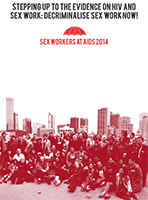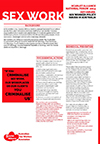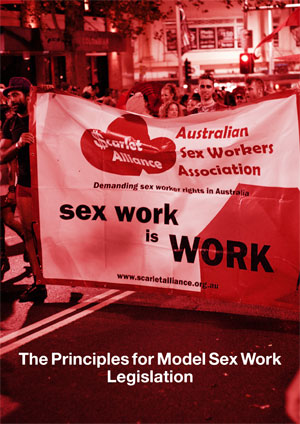|
External links
|
Scarlet Alliance Publications


Acknowledgment
Scarlet Alliance recognise that Australia is a colony built upon Aboriginal land, we pay our respect to the elders and custodians of this land, current, past and future, and stand in solidarity with the struggles of Aboriginal and Torres Strait Islander people. We are a proud member of the Anwernekenhe National Aboriginal and Torres Strait Islander HIV/AIDS Alliance (ANA).
REPORT: Stepping up to the evidence on HIV and Sex Work: Decriminalise Sex Work Now! Sex Workers at AIDS 2014

This colourful report demonstrates the strong sex worker presence at the 20th International AIDS Conference - AIDS 2014 in Melbourne, July 2014. The report documents key themes and outcomes through quotes, summaries and photos of the sex worker sessions, workshops, performances, actions, media, pre-conference and consensus statements. The content transverses issues relating to HIV and sex work, with a focus on: biomedical developments; stigma and discrimination; human rights issues including criminalisation of HIV and sex work; migration and mobility and funding. Available in PDF download, 3mb
KEY ISSUES: SEX WORKER POLICY ISSUES IN AUSTRALIA
In November 2014, Scarlet Alliance held its annual National Forum where sex workers, peer educators and peer staff of our sex worker member organisations from each state and territory in Australia gathered to hold workshops, panels, and presentations to discuss key policy issues, share successes, challenges and envision new ways forward. This resource documents the key sex worker policy issues in Australia in a briefing sheet style. Available in PDF download
PRINCIPLES FOR MODEL SEX WORK LEGISLATION
This is a resource for law reform in Australia, a summary of the research, arguments and evidence, divided into nine topics. It also includes a basic outline of sex work preferred terminology, and different types of law reform. Each Chapter has a seperate brief sheet and recommendations. First published in 2000, this updated edition draws upon a national consultation process with sex workers as well as a comprehensive literature review. Available in PDF download, 3mb
RED BOOK 2009

This sex worker handbook, often referred to as the red book is Scarlet Alliances' key resource. The resource is a reference guide for sex workers to sexually transmissible infections. The resource covers: negotiation, safe sex tools, condom breakage, general sexual health information, sexually transmissible infections, testing, checking clients for STIs, working safely in fantasy bookings, and contact information for sex worker organisations. First published in 1998, and again in 2003, this is the 3rd imprint of the Red Book.
Not available in download, for copies contact your local sex worker organisation.
SEX WORKERS WITH HIV NEEDS ASSESSMENT 2008
- Download the full report "Needs Assessment of Sex Workers with HIV", 1.98meg
- "HIV is a virus not a crime" Australian HIV Orgs Respond, 19 September 2008
- Decision to jail HIV positive sex worker by ACT magistrate John Burns appalling, says Australian Sex Workers Association, 16th September 2008
- Calls for changes to ACT Prostitution Act, ABC - September 7, 2008
- "Prostitutes afraid to check for HIV" NATASHA RUDRA, Canberra Times 5 Sept 2008
- "VICTORIAN SEX WORKERS JOIN NATIONAL CONDEMNATION OF ACT GOVERNMENT" 12 Feb 08
- "SEX WORK POSES NO RISK: Money Is Not A Health Risk" 7 Feb 08
- "Pos Worker Won't Get Fair Trial" 31 Jan 08
- Scarlet Alliance was funded by the Elton John AIDS Foundation (EJAF) via the AIDS Trust to conduct the Needs Assessment.
Unjust and Counter-Productive- The Failure of Governments to Protect Sex Workers from Discrimination 1999
A joint project of Scarlet Alliance and AFAO Sept. 1999. Written by Linda Banach (AFAO) and Edited by Sue Metzenrath (Scarlet Alliance). This was produced with the assistance of sex workers who participated in the survey upon which the report was based Also thanks to Darryl O’Donnell, Tim Leach, Chris Ward, Julia Cabassi and the staff employed at sex worker community organisations who distributed the survey.
Discrimination and harassment are a fact of life for the majority of sex workers. The Australian Capital Territory is the only Australian jurisdiction which protects sex workers from discrimination on the grounds of their occupation.
This document is a lobbying tool based on national research conducted with sex workers regarding their experiences of discrimination. It provides arguments for broadening State and Territory anti-discrimination provisions to cover occupational discrimination, overviews the current legal situation across Australia, and identifies strategies for advocacy and activism.
Five arguments for anti-discrimination protections for sex workers are discussed; discrimination harms sex workers, discrimination impedes health promotion activities, discrimination undermines regulatory objectives, anti-discrimination protections are a human right and these protections can be easily implemented.
The basis for this paper is the qualitative research gathered during the 1999 National Survey of sex workers. The findings of the research asking sex workers about their experiences of discrimination were; restrictions on working as a sex worker, health restrictions, use of condoms as evidence in prosecution, bad relations with police, lack of industrial protections, restrictions on movement, discrimination against sex worker associates (boyfriends, friends and family), discriminatory advertising practices (by publishers, newspapers, advertisers and staff at newspapers) and other forms of discrimination such as being refused credit cards and housing. People filling in the survey also had an opportunity to suggest what legal changes could be made to combat discrimination, and the most popular responses are listed.
Each state and territory in Australia is critiqued for its laws and current remedies in the case of discrimination are explored. These suggestions of action to take in the case of discrimination are a great resource for self advocacy. The paper then goes on to propose systemic strategies of action including decriminalisation and anti-discrimination laws.
The Appendix includes recommendations from the Intergovernmental Committee on AIDS Legal Working Party and a full description of research methods and demographics of the group that was surveyed in the research.
A Guide to Best Practice - Occupational Health and Safety in the Australian Sex Industry 1999
Members of the OH&S Working Group were Sue Metzenrath, Sera Pinwill, Jenni Gamble, Maggie Moylan, Cheryl Mathews, Penelope Saunders, Gabby Skelsey, Felicity Lewis, Fiona Moran and Geoffrey Fysh. Compiled by David Edler, with thanks to Chris Ward and Tim Leach.
This reads as a manual, beginning with a glossary of terms and covering all aspects of working from booking the job to storage and handling of waste. This is a great guide for all workers. It is practical, easy to read and both an educational tool for the novice while being a reminder of good work practices to those who have worked before or are working. The role of Local government and government in the enforcement of OH&S standards is explained. The responsibility of management is covered in the context of general OH&S legal principles. For workers this should be like a bible. Researchers take note! Sex workers have and do implement best practice, and this document lays it out bare.
Last updated 16 December 2014




